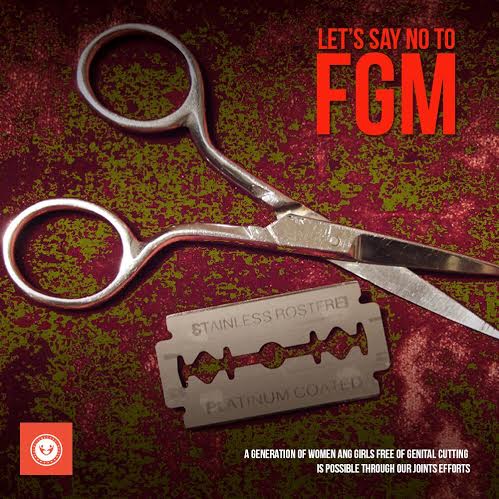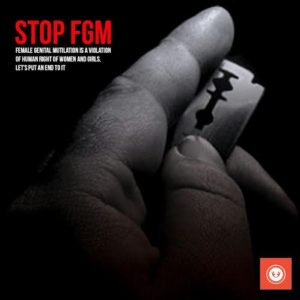News
Female genital mutilation, A Violation of Human Rights of Women and Girls

By Aderibigbe Costly Abosede
Female genital mutilation (FGM) also known as female circumcision is defined by world health organization (WHO) as all procedures involving partial or total removal of the external female genitalia or causing other injury to the female genital organs, whether for cultural or other non therapeutic reasons. It is an irreversible, unhealthy, tenacious and harmful traditional practice inflicted on girls and women. FGM is recognized internationally as a fundamental violation of human rights of girls and women as their consent are not been sorted and exposes them to medical, psychological, and social problems.
Globally, an estimation of about 200 million girls have been cut and 3 million girls are at risk every year. It is primarily practiced in 29 countries in Africa (Nigeria inclusive), and Middle East. It is also been practiced in Asia, Latin America and among immigrants in Western Europe, Australia, New Zealand and North America. 82 % of women and girls in Nigeria are victims of FGM. It is important to know that every 10 minutes, a woman or girl is been circumcised. FGM is typically carried out on girls from a few days old to puberty. It is usually performed by traditional circumcisers using a knife, razor or scissors without anesthesia.
FGM refers to a number of procedures done to alter or injure female external genitalia for non medical reasons. Regardless of which form is performed, It reflects deep rooted inequality between the sexes and constitutes an extreme form of discrimination against women.
The practice also violates a person’s right to health, security and physical integrity , the right to be free from torture and cruel, inhuman and degrading treatment and the right to life when procedure results in death. It scars girls for life depriving and denying them the chance to reach their full potentials.
Over the years, the practice was believed to fly in the face of common sense, control of women’s sexual power, and erroneous believes e.g. clitoris been threat to survival of female infants and tagged uncircumcised women as not been fertile. There are several deleterious complications of FGM ranging from immediate complications; severe pain, excessive bleeding, shock swelling of genital tissues, infections e.g. tetanus and HIV (Human immunodeficiency Virus), wound healing problems to long term complications: Urinary problems (painful urination, Urinary incontinence), chronic Urinary tract infection, vaginal discharge, itching, hypertrophic Scars & Kheloids. FGM also has effect on female sexual health on long term which includes: decrease sexual desire and pleasure, Pain during sex, reduced frequency or absence of female orgasm. Obstetrics and psychological complications includes: prolong labor, need for caesarian section or episiotomy, post traumatic distress syndrome (PTDS), depression, anxiety among others.
In May 2015, FGM was legally banned in Nigeria through domestication of violence against persons prohibition act [VAPPact] by legislative arm of government. In Nigeria,efforts to eradicate FGM have received a boost yielding results through the joint efforts of UNFPA, UNICEF and other nongovernmental organization through series of advocacy and community sensitization programs. However, despite so many interventions to eradicate FGM in Nigeria, six states top the list of where the practice is prevalent namely: OSUN been the highest with a prevalence of 76.3%, EKITI , OYO , EBONYI, IMO and LAGOS been the state with the least prevalence[44.8%].
This year’s theme for International Day of zero tolerance to FGM is ‘Bridging the gaps between Africa and the world to accelerate ending FGM by 2030’. It is hence, a clarion call to government of states with increase prevalence of FGM to double up their efforts in abandoning FGM practice by ensuring that there is proper enforcement of the anti FGM law and provide alternative means of survival in terms of economic empowerment for circumcisers that are willing to stop the practice. Government ministries in charge of women and children should work more with nongovernmental organizations to connect with the rest of the world to accelerate ending FGM by 2030 according to the sustainable developmental goal goals. Also awareness and sensitization programs should be increased at all levels among most especially the circumcisers, traditional birth attendants and women in communities. Together, let us lend our voices to saying No To FGM globally andsimultaneously acting locally to eradicate FGM.
A future where every girl will grow up to experience her inherent dignity, human rights and equality is attainable by year 2030 through our joint efforts. Let’s join hands together to ‘ABANDON FGM’.
Aderibigbe Costly Abosede,
CEO and President of Value Female Network NGO.
aderibigbecostly@gmail.com
+23481-3473- 0893.
-

 News4 days ago
News4 days agoCapacity Building: OHIS Organizes Retreat For New Board Members
-

 News3 days ago
News3 days agoFamily Of Gruesomely Murdered Pastor Cries For Justice
-

 News5 days ago
News5 days agoOsun RAAMP Opens Bid For Road Constructions Statewide
-

 News2 days ago
News2 days agoJust In: Nigerian Governor Dethrones 15 Traditional Rulers, Reinstates 7





